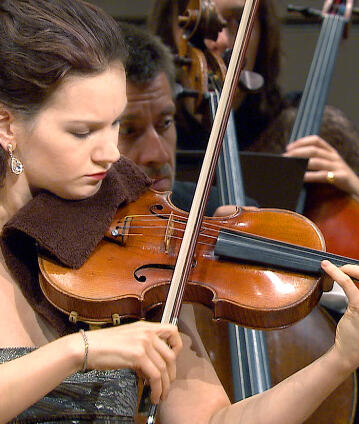Tugan Sokhiev and Hilary Hahn

Hilary Hahn caused a sensation in the music world at the end of the 1990s as a young violinist who enthralled audiences not only with her perfect technique, but also with her consummate musicianship and creative powers. In this performance of Vieuxtemps’s absurdly virtouso Violin Concerto No. 4, she is accompanied by Tugan Sokhiev who also conducts Tchaikovsky’s rarely heard Manfred Symphony in the second part of the concert.
Lord Byron’s Manfred is a key work of literary Romanticism. With stylistic features from Elizabethan drama and the English Gothic novel of the 18th century as well as elements of the ancient Orpheus myth, this poem, published in 1817, tells the tale of a brooding loner whose desperate world weariness and insatiable thirst for knowledge lead to his ultimately demise.
Not for nothing did Byron want his Manfred to be seen as a response to Goethe’s Faust! And Byron’s “dramatic poem” with its grandiose descriptions of nature, eerie apparitions and dramatic events, simply cries out for music. After Hector Berlioz expressed an interest in the material, Robert Schumann wrote – like his long misunderstood Scenes from Goethe’s Faust – incidental music to Manfred in 1848. Pyotr Ilyich Tchaikovsky tackled the subject in the form of a large-scale orchestral work in 1885. Taking on all fronts like its literary source, this work shifts between symphonic poem in four movements and four-movement programmatic symphony in a composition by Tchaikovsky which is still rarely performed.
Unjustly so, in the opinion of the conductor Tugan Sokhiev, born in 1977. In this concert with the Berliner Philharmoniker, he presents Tchaikovsky’s Manfred Symphony. First of all, however, Hilary Hahn enchants the audience with the music of Henri Vieuxtemps, which focuses wholly on instrumental virtuosity. For her performance with the Philharmoniker, the American violinist chose the composer’s equally rarely heard Fourth Violin Concerto in D minor op. 31.
© 2014 Berlin Phil Media GmbH
Related interviews
Artists
Our recommendations
- Concert with Mariss Jansons and Hilary Hahn from Suntory Hall
- Liszt’s Piano Concerto No. 1 with Tugan Sokhiev and Boris Berezovsky
- Tugan Sokhiev and Nikolai Lugansky
- Tugan Sokhiev and Yefim Bronfman perform Beethoven
- Tugan Sokhiev conducts Rachmaninov, Borodin and Prokofiev
- A “Russian Evening” with Tugan Sokhiev and Vadim Gluzman